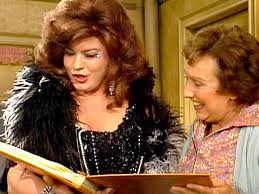
In All in the Family‘s unforgettable two-part episode “Edith’s Crisis of Faith,” Edith faces a devastating tragedy that shakes her belief in goodness and God. A powerful exploration of grief, faith, and humanity.
A Storyline That Stunned Viewers
“Edith’s Crisis of Faith,” a two-part holiday episode from All in the Family, broke new ground for American television. Known for its comedic edge, the series took a bold turn when it tackled one of the most painful and sensitive topics of its time: the murder of a close friend due to a hate crime.
The episodes follow Edith Bunker, a character beloved for her warmth, innocence, and unwavering faith, as she experiences a spiritual and emotional breakdown after the death of her friend Beverly LaSalle—a transgender performer who had appeared in previous episodes.
Edith’s Unshakeable Kindness Meets Cruel Reality
Edith had always been the emotional anchor of the Bunker household—a woman full of compassion, patience, and Christian values. But when Beverly is murdered simply for who she was, Edith can’t comprehend the cruelty of the world around her.
For the first time, we see Edith question her belief in God, asking how a just and loving power could allow something so senseless to happen. Her raw grief and shaken faith are portrayed with heartbreaking realism by Jean Stapleton, whose performance remains one of the most moving in television history.
A Conversation Far Ahead of Its Time
All in the Family was never afraid to push boundaries, and “Edith’s Crisis of Faith” did exactly that. The episode brought attention to violence against the LGBTQ+ community—a subject almost never addressed on TV in the 1970s.
It also explored how tragedy can fracture even the most devout faith. Edith’s struggle resonated with viewers across all backgrounds, reminding us that doubt and grief are part of being human—even for the kindest souls.
The Quiet Strength of Edith Bunker
What makes this episode so powerful is its emotional honesty. Edith doesn’t bounce back right away. She grieves, she doubts, she feels lost. And yet, she never loses her capacity for love and empathy. Her character proves that true faith isn’t about never questioning—it’s about how we move forward in spite of it.
Final Thoughts
“Edith’s Crisis of Faith” is more than just an episode—it’s a milestone in television history. It dared to speak truths that many shows avoided, giving voice to victims, to grief, and to those struggling with belief in an often unfair world. Decades later, its message remains as powerful and relevant as ever.